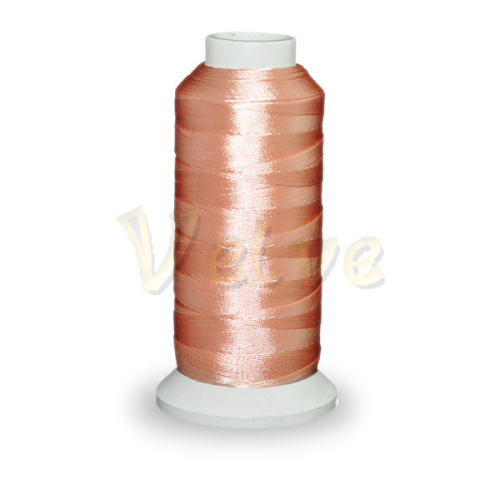1 / 1
Monofilament Nylon Fishing Twine 210d
Get Latest Price
Send Inquiry
| Model No. : | 40/2 |
|---|
Dongguan Cocou Textile Materials Co., Ltd.
You might also like
Product description
Product Description
Overlock thread
Brings out an interesting comparison between Corespun and Spun Threads to help understand the difference between the two better and the reason why corespun gives better results in denim sewing. Corespun threads, sometimes referred"pcore" or "polycore" or "cottoncore", are made by wrapping a staple polyester or cotton wrapper around a continuous filament bundle of polyester fibers during spinning, and then plying these yarns into a sewing thread. The continuous filament polyester core makes up approximately 60% of the thread construction.
This core contributes to:
Higher strength per size (higher tenacity)
Greater uniformity in size, strength and other physical characteristics.
A higher initial modulus or resistance to stretching contributing to better loop formation and reduced seam puckering.
Better ply security fewer unravel type thread breaks
Superior abrasion resistance & durability
The wrapper of a corespun thread can be either staple polyester or staple cotton.
The wrapper gives the thread a fibrous surface that contributes to:
A softer "hand" or feel than a 100% continuous filament threads
A matte finish stitch appearance similar to a spun thread construction
Superior frictional characteristics compared to a continuous filament threads
The Poly wrapper contributes to:
O Superior color fastness, chemical and abrasion resistance
O Higher strength than cotton wrapped corespun threads
O Superior "union dyeing" because of one-step dyeing process
The Cotton wrapper contributes to:
O Superior needle heat resistance
O A "wash-down" stitch appearance
What are the benefits of using core spun yarns on denim?
40 to 50% stronger than spun polyester threads the same size
Superior sewability on both manual and automatic machines with minimum interruptions fewer restitched seams.
Helps to Minimize Open-Seams and Seam Failure
Allows the use of smaller diameter thread to minimize Seam Puckering or Needle cutting
Helps to minimize broken and cut stitches after finishing.
Spun Polyester threads, sometimes referred to as "PP" or "PP Spun", are made by spinning 100% polyester staple fibers into yarns and then plying these yarns into a sewing thread.
Spun Polyester threads are normally made in a two or three ply constructions
Depending on the yarn size.
Spun polyester threads generally have much lower single end breaking strength than corespun threads.
Core spun yarns are definitely more expensive than the spun polyester yarns. The usage of these yarns can increase the cost of production. However, using spun polyester yarns can increase the possibility of broken stitches and rejected garments or needing repairs.
We mentions that certain manufacturers have tried to use both Core Spun and Spun Poly to achieve a balance between costs and performance.
Since overedge seams consume the most thread, they will used spun polyester on these operations while continuing to using corespun threads on all topstitching and stress seam operations.
Brings out an interesting comparison between Corespun and Spun Threads to help understand the difference between the two better and the reason why corespun gives better results in denim sewing. Corespun threads, sometimes referred"pcore" or "polycore" or "cottoncore", are made by wrapping a staple polyester or cotton wrapper around a continuous filament bundle of polyester fibers during spinning, and then plying these yarns into a sewing thread. The continuous filament polyester core makes up approximately 60% of the thread construction.
This core contributes to:
Higher strength per size (higher tenacity)
Greater uniformity in size, strength and other physical characteristics.
A higher initial modulus or resistance to stretching contributing to better loop formation and reduced seam puckering.
Better ply security fewer unravel type thread breaks
Superior abrasion resistance & durability
The wrapper of a corespun thread can be either staple polyester or staple cotton.
The wrapper gives the thread a fibrous surface that contributes to:
A softer "hand" or feel than a 100% continuous filament threads
A matte finish stitch appearance similar to a spun thread construction
Superior frictional characteristics compared to a continuous filament threads
The Poly wrapper contributes to:
O Superior color fastness, chemical and abrasion resistance
O Higher strength than cotton wrapped corespun threads
O Superior "union dyeing" because of one-step dyeing process
The Cotton wrapper contributes to:
O Superior needle heat resistance
O A "wash-down" stitch appearance
What are the benefits of using core spun yarns on denim?
40 to 50% stronger than spun polyester threads the same size
Superior sewability on both manual and automatic machines with minimum interruptions fewer restitched seams.
Helps to Minimize Open-Seams and Seam Failure
Allows the use of smaller diameter thread to minimize Seam Puckering or Needle cutting
Helps to minimize broken and cut stitches after finishing.
Spun Polyester threads, sometimes referred to as "PP" or "PP Spun", are made by spinning 100% polyester staple fibers into yarns and then plying these yarns into a sewing thread.
Spun Polyester threads are normally made in a two or three ply constructions
Depending on the yarn size.
Spun polyester threads generally have much lower single end breaking strength than corespun threads.
Core spun yarns are definitely more expensive than the spun polyester yarns. The usage of these yarns can increase the cost of production. However, using spun polyester yarns can increase the possibility of broken stitches and rejected garments or needing repairs.
We mentions that certain manufacturers have tried to use both Core Spun and Spun Poly to achieve a balance between costs and performance.
Since overedge seams consume the most thread, they will used spun polyester on these operations while continuing to using corespun threads on all topstitching and stress seam operations.
Supplier's popular products
Send your inquiry to this supplier
Send Inquiry



























